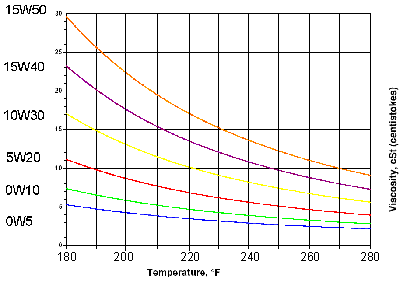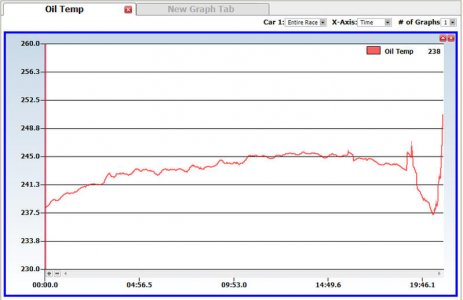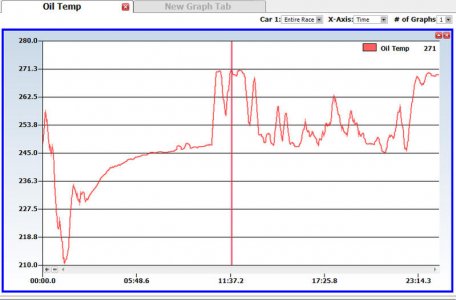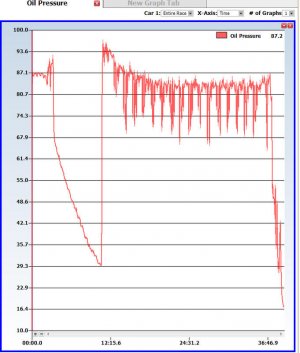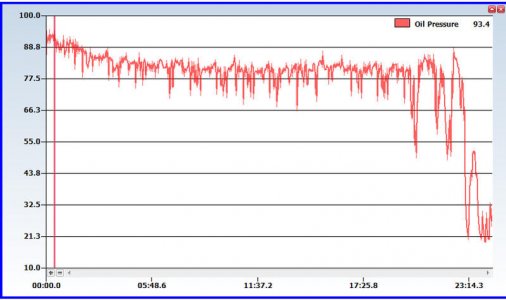I suspect that this means the readings show that oil temps with track use are getting close to 260F operating temp at their peak/max - pretty consistent with my SPA gauge readings. And shouldn't this make obvious that the 40w or even 50w helps for track use then?
You would think so. But like the
last oil thread revealed, their is always going to be a subset of people that swear on the bible that the Honda owners manual knows best. They will proclaim the general purpose 10W30 rating is the shizzat for tracking/racing, because quite frankly that's what they want to believe, and they will in turn shop around until they get the answer they want to hear.
I partially have to disagree

Changing the cold viscosity from 15 to 10 or 5 I fully agree, however changing the warm viscosity to 30 I completely disagree, espec when the car is occasionally tracked.
I would never go lower than 40.
I agree. Let's consider some real logs. Consider the chart below. Here is what I consider to be a typical scenario. Early morning, about 12 laps or 20 minutes here. Ambient at 59 degrees, the high was only 70 degrees on
June 14th. Pushing the car around decently. Consider this- with the Accusump, 8 quarts total system capacity, and various other misc cooling mods on my race car (which the average DE day enthusiast probably doesn't have on their sports car.... ducted hoods, NACA ducts, insulation, modified cooling system, gutted trunk, etc...) we are already looking at ~240 some odd degrees.
Now, per the
SAE standard, an oil is considered to be a 30 weight in the range of 9.30-12.49 cST at 100C.
M1 5 or 10W30 has a spec rating of 10-11.3 - so their 5W30 is right about in the middle, so we'll use that.
Plug the numbers in, and at the peak recorded operating temp of 246 degrees, the M1 5W30 would really have an effective viscosity of 7.3 cST to protect your vital engine parts. In short, even in this modest case study, the M1 5W30 would have thinned-out to an effective 20 weight during operation.
Another data point. Let's raise the bar a notch. What can a warm summer mid-afternoon look like even just dolling around? Well, it was 84 degrees peak on
May 17th at the time this evening log was taken (it's probably that by breakfast for many of you in the desert). The large dips/spikes coincide with HPDE traffic as I get no air flow to my pan when I am off-pace. However, note that after about lap 1 this chart pretty much begins where the last peaked off in terms of average temps; even despite the fact that I wasn't racing. Another interesting point to this chart- you can be harder on your equipment and drive slower.
Do the math. Given the same M1 5/10W30 weight product, about 4.7-5.5 cST, so it would have thinned out to a 10 operating weight at this point! Good thing I don't have that in there!
So I think this all begs the question... what does worse case look like? Remember, I have very mild conditions in my region. What happens when you are racing for 40 minutes in 105F? What happens if it is really hot and you decide to run two sessions back to back, scrub an outlap, sit idling in the hot pits, or check yourself into a 24hr Enduro?
My experience, 265 is not in anyway uncommon for a probe in a
stock NSX pan. That is consistent with other people's experience. Even with the thicker oil, you are going to be nestled at the upper allowable limit. If your cooling system is not performing ideally, if it creeps hotter, if you are nose to tail and not getting enough airflow across your radiator, if you are just slow and reving it up all the time, if you are running rich..... and you have thinned the hell out of a 30W... your charts are going to look a lot worse than mine as it shears, and 160C / 320F is possible at which point you are going to basically be running a 0 weight oil through your engine and seriously compromising your protection. Maybe time to look at that HTHS rating? That's what NA looks like.
For you FI guys, think about the heat. Why do you think Rob Morrison had like $5,000 into his cooling system in his supercharged NSX? You think RTR went by the factory manual? Hell no. Before I go FI, I plan to add a crap ton of supporting mods before cramming in 35% more air and fuel in each cylinder.
Conclusions- Given any significant, sustained track/race usage, forget the owners manual knows what fill is best here. While the manufacturers intended operating viscosity is correct and what you want - the specified weight spec is simply not intended for the operating temps customarily encounted during tracking/racing. Leave the general purpose 30 weight A1 oils for the blvd. where they belong. What matters with weight is the viscosity at the actual operating temps on course. Do consider the HTHS rating.
My 0.02





